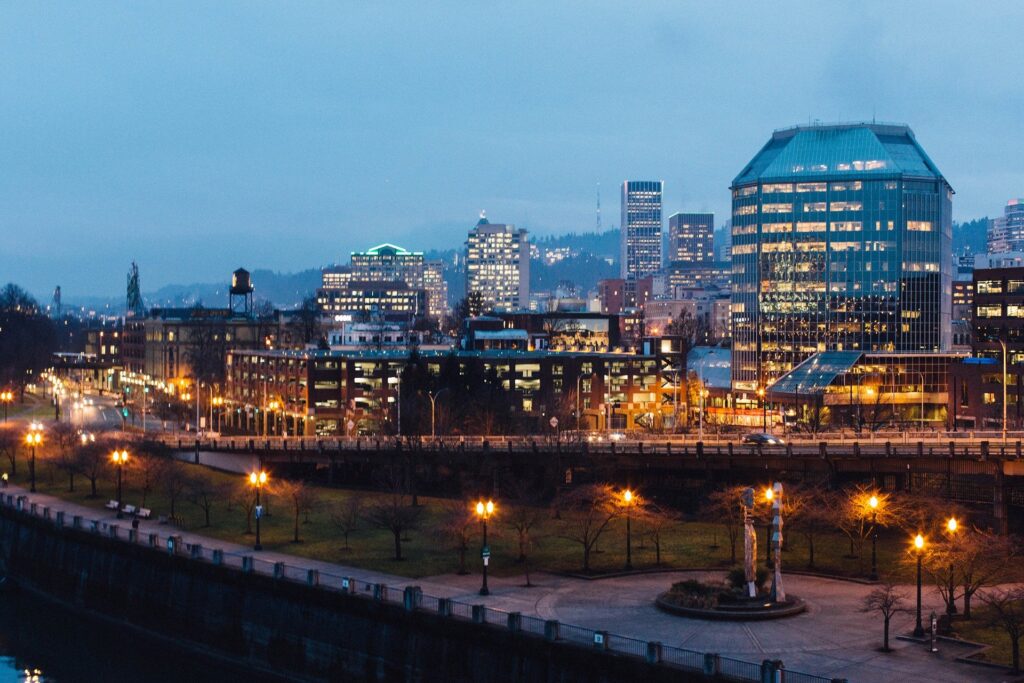Though 2020 has been a year dominated by the COVID-19 crisis, the threat of climate change continues to loom and only grow with time. In the Pacific Northwest, the City of Portland, Oregon is taking an immediate stand to confront the impacts of climate change for its residents, particularly the most vulnerable.

After passing an Emergency Climate Declaration earlier this year that called for the City to take greater climate action and build greater resources to do so, the City Council introduced a new proposal in late November that will place a fee on greenhouse gas emissions and air pollution for the largest polluters in the Portland area. The proposal, titled “Clean Air, Healthy Climate,” will establish two new fees that will aim to raise about $11 million per year to support pollution reduction programs in the City, particularly for black, indigenous, and communities of color that are most impacted.
The two fees are presented as follows:
- “The Healthy Climate fee would establish a $25 per-ton fee on GHG emissions from facilities in Portland with emissions of 2,500 metric tons of CO2e (carbon dioxide equivalents) per year or greater.”
- “The Clean Air Protection fee would establish a tiered fee ($15,000/$25,000/$40,000) on facilities that generate substantial hazardous air pollution locally.”
Though both of these measures are based on the “polluters pay” principle, which calls for the party responsible for producing the pollution to pay for damages done to local communities and economies, neither are being introduced as a carbon tax. The Healthy Climate Fee will be assessed per tonnage of CO2e, but the City Council points out that their fee does not include the full social costs of carbon like an actual carbon tax would (and which they estimate would start at $117/ton).
Instead, this proposal is being presented as a fee on pollution levels that would help Portland build the funds necessary to implement City-led policies and programs required to achieve GHG reductions and improve air quality for Portland residents. Currently Portland is 19% below 1990 GHG emission levels, and they have a goal to reach at least 50% below 1990 levels by 2030. The hope is this proposal will help get them there through a variety of solutions, including encouraging polluters to shift away from fossil fuel resources and transition to cleaner energy.
The social justice component to this proposal is also very compelling. Portland is recognizing that their black, indigenous, and communities of color have long been underserved and are disproportionately impacted by climate change. Therefore, they require immediate resources to fund a just and equitable transition to a healthier and more sustainable future. If passed, this proposal will complement the Portland Clean Energy Fund, which is funded by a tax passed in 2018 to generate funds for climate action that advances racial and social justice by supporting local community organizations.
Portland is not alone in their pursuit of pricing carbon emissions. Earlier this year, the State of Oregon proposed a “Cap and Reduce Program” that would act as an ETS (emissions trading scheme) on carbon pollution across the state. The statewide proposal has not yet passed, but if it does, the City of Portland does not see their proposal as duplicative to the state’s effort. The City believes their Clean Air, Healthy Climate proposal will be complimentary, and also more localized to achieve their reduction goals and address their pollution challenges.
It is uncommon to see efforts to price carbon from smaller and more local governments. However, Portland would not be the first city to pass a climate-related fee. In 2006, Boulder, CO became the first US city to implement a voter-approved climate mitigation tax called the Climate Action Plan (CAP). This too is not a traditional carbon tax as it is based off electric usage (in kWh) and not carbon content. The program has been renewed twice and currently raises about $1.8M per year for additional reduction programs in the local community.
Will Portland be the next city to join them? The Clean Air, Healthy Climate proposal is currently available for public comment until early January 2021. Though this may not be a traditional carbon price as seen in other jurisdictions, it is nonetheless a compelling motion and initiative that a local government can take to get polluters to pay and fund important climate justice initiatives for its residents.